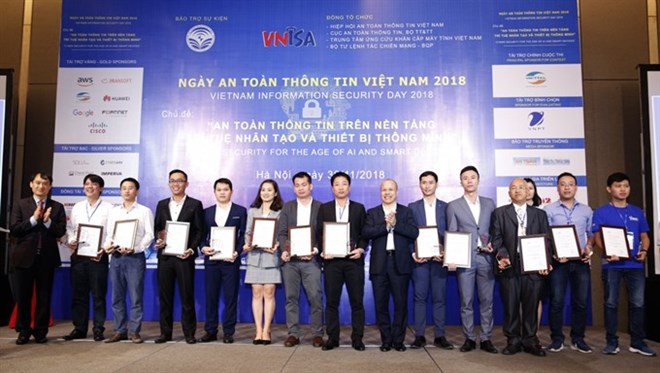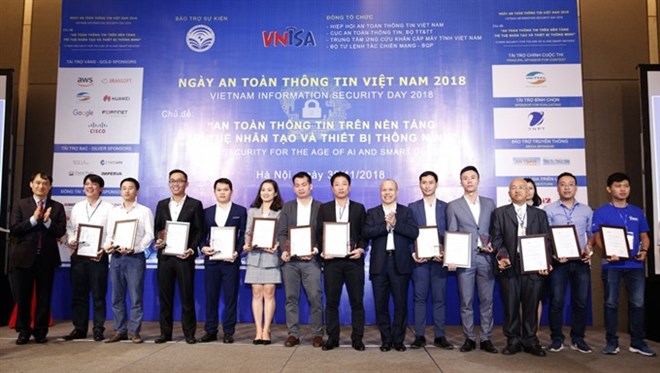
The 2018 Information Security Index of Vietnam was 45.6 percent, a figure at average level, reported by Vietnam Information Security Association (VNISA) in Hanoi on November 30.
The 2018
Information Security Index of Vietnam was 45.6 percent, a figure at average
level, reported by Vietnam Information Security Association (VNISA) in Hanoi on
November 30.(Source: cmc.com.vn)
Data from VNISA revealed the country’s
information security indices were 47.4 percent, 59.9 percent and 46.8 percent
respectively in 2015, 2016 and 2017.
The 2018 Vietnam Information Security Day conference under the theme "Cyber
security for the age of artificial intelligence and smart devices” was hosted
by the VNISA, in collaboration with the Authority of Information Security and
the Vietnam Computer Emergency Response Team under the Ministry of Information
and Communications and the Command 86 under the Ministry of Defence.
Vietnam has about 350,000 IoT (Internet of Things) devices on the Internet,
most of which are cameras and routers. More than 40 percent of those might be
affected by information security loopholes, said Nguyen Thanh Hung, Deputy
Minister of information and communications.
Speaking at the conference, Hung said in the future, artificial intelligence
(AI) and IoT would be two concepts which are always mentioned together.
"IoT generates huge amounts of data and AI helps analyse and process
it."
Even though IoT promoted the digitisation of many industries, it posed security
threats to new technology applications, he said.
Tools used to attack IoT devices were becoming more sophisticated, algorithms
used to attack and artificial intelligence (AI) would be increased in the level
of both attack and defence.
On the other hand, some of the terminal devices would become new targets,
including refrigerators,robotvacuumcleaner, street lights or
watches.
According to Gartner’s report, more than 25 percent of the attacks are from
IoT-related companies by 2020.
"It is possible to see the risks in the coming time, in which malicious
code will become smarter and the perfect environment for them is the network of
IoT devices," said Hung.
This would be a great challenge that State agencies, organisations, businesses
and the community in Vietnam must pay attention to in order to avoid unexpected
consequences, he said.
The Deputy Minister also noted that cyber security was a long-lasting war.
However, he also noted information security was a field that Vietnam could make
strides in comparison with other areas of science and technology.
Basically, information security was based on human resources, not too dependent
on infrastructure.
One of the ways to enhance information security in Vietnam was to create
stronger trust among the society, he said. Trust was the key to success in the
field of cyber security.
To promote the work to ensure cyber security, the deputy minister suggested
State agencies and social organisations pay more attention to the work,
regularly updating knowledge and new technologies, while technical systems must
ensure information safety and meet the conditions for preventing and combating
network attacks.-
Source: VNA
According to data from the Hoa Binh Provincial Party Committee, the industrial production index for the first six months of 2025 is estimated to have increased by 20% compared to the same period last year. This marks the highest year-on-year growth rate for this period since 2020.
In the first six months of 2025, Hoa Binh province’s export turnover was estimated at 1.145 billion USD, marking an 18.11% increase compared to the same period in 2024. Import turnover was estimated at $ 804 million, a 17.15% increase, which helped the province maintain a positive trade balance.
The lives of the ethnic minority farmers in Tan Lac district have gradually improved thanks to the new directions in agricultural production. This is a testament to the collective strength fostered through the professional associations and groups implemented by various levels of the district’s Farmers’ Union.
With the motto the "product quality comes first,” after nearly one year of establishment and operation, Muong village’s Clean Food Agricultural and Commercial Cooperative, located in Cau Hamlet, Hung Son Commune (Kim Boi district), has launched reputable, high-quality agricultural products to the market that are well-received by consumers. The products such as Muong village’s pork sausage, salt-cured chicken, and salt-cured pork hocks have gradually carved out a place in the market and they are on the path to obtaining the OCOP certification.
In the past, the phrase "bumper harvest, rock-bottom prices" was a familiar refrain for Vietnamese farmers engaged in fragmented, small-scale agriculture. But today, a new spirit is emerging across rural areas of Hoa Binh province - one of collaboration, organisation, and collective economic models that provide a stable foundation for production.
Maintaining growing area codes and packing facility codes in accordance with regulations is a mandatory requirement for agricultural products to be eligible for export. Recently, the Department of Agriculture and Environment of Hoa Binh province has intensified technical supervision of designated farming areas and packing facilities to safeguard the "green passport" that enables its products to access international markets.



